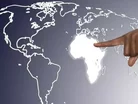Africa’s telecoms transformation

In South Africa, there are several issues affecting the telecom industry. In the mobile space, competition is fierce with players vying for market share by lowering pricing and bundling with additional products and services to offer value adds. In short, telecommunication companies must become more competitive. However, this competitive pricing war is set against a backdrop of a volatile currency where the weakened foreign exchange rate is impacting telcos’ direct input costs. The weakened exchange rate impacts the huge investments needed to roll out and expand networks as well as handsets (that are often bundled with contracts). These are mostly sourced from international suppliers. As such, telcos face a challenge in balancing competitive pricing strategies against investments required to build network capacity.
We are also seeing movement in the fibre connectivity space. There are more than 40 companies that are rolling out fibre services to homes and businesses in South Africa, also making this a highly competitive environment. We are seeing massive growth in data consumption – from businesses and consumers – which is driving these initiatives. However, we have also started to see some consolidation in this space where larger players have acquired or partnered with smaller players. We expect to see further consolidation in this space.
With regards to LTE and the introduction of uncapped services, the over-arching theme of an exponential increase in data consumption means that these players are also having to invest heavily in upgrading their backhaul networks to accommodate this surge in consumption.
The rest of Africa is also challenged by the volatile exchange rates, resulting in them experiencing similar problems to South Africa. They are also experiencing increasing volumes of data consumption and a need to expand and invest in networks. This is core to supporting the growth of business and the economy in the region. However, many countries in Africa also face the challenge of extending coverage as they feature dispersed communities with small, rural villages. This makes it difficult to justify investment in infrastructure due to the sparse population of these areas. Another challenge is that there is less ‘revenue per user’, which further hinders expansion of networks.
Fibre to the home and business hasn’t really gained as much traction in the rest of Africa as what we are now seeing in South Africa. This is likely due to the limited and sparse demand for these services. Fibre network growth in the rest of Africa is mostly being driven by the need to interconnect cities and dense population areas with backhaul networks.
Africa is unique in that we are seeing lots of innovation introduced to the region due to the uptake of smartphones and mobile communication. Disruptive apps are being developed that are changing business models and supporting business operations. Telecommunication is at the core of this. The attraction to information driven opportunities is being assisted by the lower barrier to market entry.
Moving forward, African countries need to work cohesively and build infrastructure across the continent in order to create a ‘free flow model’ where telecommunication and data flow is not restricted. Governing bodies need to come together to create policies and regulatory frameworks that support and stimulate this. After all, telecommunication infrastructure is just as vital to economies as road and rail infrastructure for example. This will create an environment that attracts foreign investment with sustainable returns as well as sustainable competition.
1) What has Wipro achieved since entering the African market in 2007?
We have grown from 2007 to a multi-industry business delivering value to many customers across the African continent. During this phase of growth, we have localised our delivery team through skill development programmes. Also, we have proven our commitment to South African transformation by being compliant to a Level 2 BBBEE status.
2) How does Wipro plan to expand its African presence?
We have a strong delivery track record in the telecommunication and financial services sectors and have a strong delivery track record in several African countries. We will continue this growth in Africa through a focus on other select industries, a continued commitment to localisation and partnerships to assist in ensuring timely access to these new frontiers. We will remain relevant by offering services that addresses our customers Run and Change IT services requirements with a focus on digitisation.
Hrusostomos Vicatos is the Telco Business Development Executive for Wipro Limited. Gavin Holmes is the Country Manager for Wipro. Wipro is a multinational Information Technology, Consulting and Business Process Services company.
- How analogous inspiration can solve your strategic deadlockLeadership & Strategy
- Cloud is driving IT spending through the roof across EuropeTechnology
- Tech consultancy Wipro recognised as top global employerLeadership & Strategy
- Why Wipro has chosen Dubai for its APMEA headquartersLeadership & Strategy



